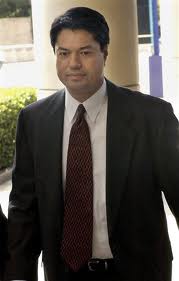 In what can only be described as an over-the-top and spiteful request, the prosecutors in the sad case of Jamie Olis requested yesterday that U.S. District Judge Sim Lake resentence Olis to a 15 year jail sentence that is exceeded in its absurdity by only the 24 year sentence that the prosecutors improperly obtained in Olis’ original sentencing hearing.
In what can only be described as an over-the-top and spiteful request, the prosecutors in the sad case of Jamie Olis requested yesterday that U.S. District Judge Sim Lake resentence Olis to a 15 year jail sentence that is exceeded in its absurdity by only the 24 year sentence that the prosecutors improperly obtained in Olis’ original sentencing hearing.
Although the prosecution’s brief on resentencing is not yet available publicly, the Chronicle story on the brief reports that the prosecution is holding to the absurd theory that Olis’ allegedly criminal actions contributed to a $20 to $50 million decline in the value of Dynegy stock.
Meanwhile, because Olis does not believe he did anything wrong and thus, declines to rat on other Dynegy executives, the government ratchets up its proposed sentence to the highest possible level.
The Olis case is proof that the concept of prosecutorial discretion is dead at the U.S. Department of Justice.










